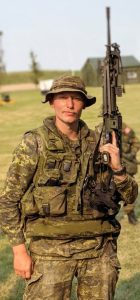- 2025-05-14
- Blog
Flipping a switch: My journey from Reservist to Atlas

Growing up I played a lot of team sports, which shaped my passion to work with others. During my time at the University of British Columbia, I desired a sense of camaraderie and community that only a team — a group of like-minded individuals working toward a common goal — could provide. Thinking that the military could satisfy this need, I began my application to join the Canadian Armed Forces (CAF) as a Reservist. In January of 2020 I was sworn in as an Officer Cadet with the Seaforth Highlanders of Canada.

However, after only a few months in Depot Platoon of physical training, learning basic parade drill and weapons handling, the COVID-19 pandemic began. This unfortunately caused my Basic Military Qualification (BMQ) course to be delayed. Instead of completing BMQ in one leap during the summer months, I was obligated to give up my weekends from September until March of that year. Simultaneously I continued working my civilian job as a research assistant and volunteering weekly night shifts as a crisis line counsellor.
As a Reservist you quickly learn the behaviour of “flipping a switch” between your civilian and military world. You leave the office at 5 p.m. on a Wednesday night and casting aside your role of civilian, you go to your military unit and don the relish uniform. More specific to me at the time, I was dishevelled on my way back from a weekend field exercise when I was called in for an overnight crisis line shift. My demeanour would need to change from a stoic soldier to an empathetic service provider despite my mood and exhaustion. Due to the combination of these duties and responsibilities during a turbulent and uncertain time, my own mental health dwindled and I had begun to discover the desire for changing the way we think about, deliver and access mental health care.
During crisis line counselling I observed many people facing barriers to access and complexities of system navigation. Similarly, I noticed this pattern with my own mental health care, which was also exacerbated by the nuances of military service. One example was the stigma associated with help-seeking in the military for both physical and mental health challenges. While I was capable of exploring pathways forward for my own needs, I needed tools that could create meaningful change at a system level for others that were experiencing similar challenges. I started applying to Master of Public Health programs as I continued with my military training for the next year at Canadian Force Bases Edmonton and Wainwright. I was enthralled to receive my acceptance to the University of Western Ontario and soon I was attach posted to 4th Battalion, The Royal Canadian Regiment in London, ON.
During my Master of Public Health, I discovered the Atlas Institute for Veterans and Families and completed my practicum at the organization. I was tasked with co-creating visual plain-language summaries based on a previously commissioned research gaps and knowledge needs report. In doing so, I realized that Atlas envisioned a future for mental health care that served Veterans and Families, which aligned with my own mission. I also learned that my skills and experience would be more tailored towards a research position.
Although I have now flipped the switch to being a civilian full-time, I continue to work on addressing the mental health challenges that I experienced as a CAF member and as a Veteran. Through my education, lived experience and work at Atlas, I am now able to help change the way we think about mental health care for Veterans and Families, such that we can improve treatment and support. Today, I am committed to serving Veterans and Families as selflessly as they have served our country with courage, loyalty and integrity.
One of these ways is the through my work on the peer support guidelines for Veterans, military, Public Safety Personnel, and Families. Peer support is an important resource for these populations as it is one of the most common mental health services available. As well, people are more willing to connect with those who share relevant personal and/or professional lived experience. These evidence-based guidelines have been developed to reflect the unique, distinguishing features of peer support for Veterans, military, public safety personnel and their Families.
With all that being said, it was an honour to serve in the CAF. I am proud of my service and I am thankful for all that have served and continue to serve today. I hope that together we are able to improve systems, treatments and supports to better the mental health of Veterans and Families.
— Leo
Leo Goudal, MPH
Research and Policy Analyst
Atlas Institute for Veterans and Families
Are you a Veteran or Family member with a story to tell? Get in touch with us and you may be featured on this blog!

